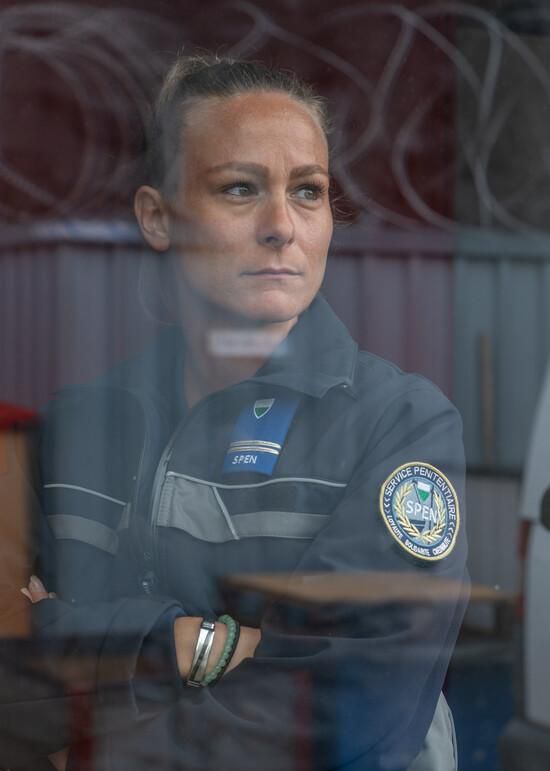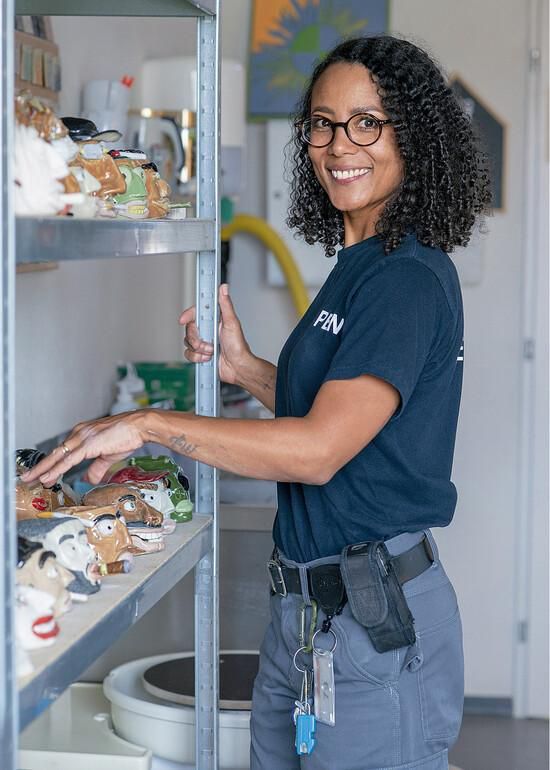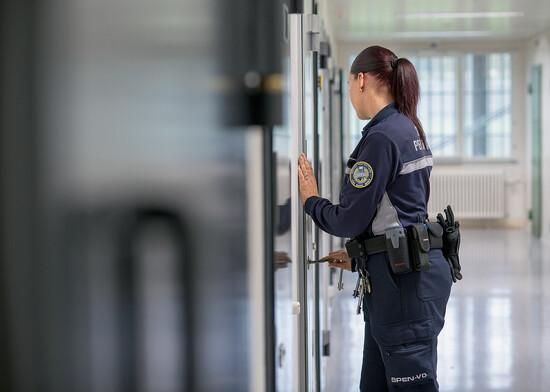Prison environment –
Detention officers testify about their profession
We met three detention officers who work for SPEN. The opportunity to discover this shadowy profession, far from the clichés.
Published today at 10:00 a.m.
Johanne Osti is deputy chief at the Bois-Mermet penitentiary establishment in Lausanne.
CAROLINE RAEMY
Subscribe now and enjoy the audio playback feature.
BotTalk
This article from November 8, 2024 was imported from Femina.ch and republished on our site on January 7, 2025.
In the canton of Vaud, 350 detention officers work for the Prison Service (SPEN) and take care of the care of people detained in the five penitentiary establishments for adults as well as in the one for the detention of minors and young adults.
Since this summer, a new recruitment process has been put in place in the region with the organization of public information sessions four times a year. Evenings during which it is possible to meet people in uniform and learn more about this profession and the prison environment, which is often unknown to the public. SPEN is seeing more and more female candidates, but to date they only represent 17% of detention officers. To discover the reality of their profession, we were able to meet three women working in three Vaud prisons for men.
Bois-Mermet Prison
The first appointment is made at the Bois-Mermet penitentiary establishment in Lausanne, where detentions take place before a judgment. There we find Johanne Osti, 39 years old, deputy chief in this prison since 2021. “I cannot present you with a typical day, because they are always different,” she explains to us. But I manage the detention officers, I give them the daily missions and I support them in their tasks. I must also be present to answer questions from incarcerated people.”
Some days are quieter than others, but the arrival of new people and their placement in cells can quickly take time. “With the prison full, the mission is not easy. We have to find who to put together so that cohabitation goes well,” specifies the Vaudoise. The establishment is designed for 100 people in cells, but accommodates 170. A situation of overcrowding that many prisons have faced in recent years in the face of the increase in the number of people detained. An increase of 7% was, for example, recorded in 2024.

Johanne Osti, sous chef in Bois-Mermet.
CAROLINE RAEMY
Johanne Osti launched into the profession in 2013, after working in sales. “It was my mother who showed me the advert and encouraged me to apply, because I didn’t really see myself there at first.” She, who dreamed of being “Julie Lescaut” when she was younger, didn’t really know this other profession. Before taking up her position in Lausanne, she worked for eight years as a detention officer at La Croisée prison in Orbe. “After my first day of internship, I knew that this was what I wanted to do,” she says. But if you don’t feel good in this particular atmosphere, you shouldn’t stay.”
Three days of immersion are in fact planned at the start of the training to find out if the environment is bearable. Among the aspects that could put off some people, the deputy chief mentions in particular stress, the sound of doors opening and closing – an imposing sound which will accompany us throughout our report – and the fact of being locked up. . “It’s true that all this causes a lot of fatigue, psychological more than physical. We spend a lot of time talking with the inmates. When I go home, I no longer think about work because it is important to take a break, otherwise we won’t get through it,” notes Johanne Osti.
A distance from them must also be respected: “They can tell us heavy things related to their life or their incarceration, but we must not take these aspects personally. This does not prevent us from having empathy. Our mission is to support them during their detention. There is the security side, but there is also the social side. It is essential not to judge them, particularly based on their crime, and to treat them all fairly.”
And as a woman, what is it like to work among men? “I always took it as a strength. They feel differently in our presence, they are surely more easily able to open up with us,” reveals Johanne Osti. She also deplores the prejudices of certain people who think that she only “opens and closes the doors”, or who fear for her safety: “I have never been afraid, if I have a problem, I press one button and all my colleagues arrive in a few seconds. And you should know that we have no weapons, communication is our greatest ally.”
Minors and young adults detained
The rest of our report takes us to Palézieux, to the establishment for minors and young adults (EDM) Aux Léchaires. It accommodates girls and boys aged 10 to 25 in a closed environment, with currently 36 people detained. There, workshops and specific lessons allow them to continue their school curriculum.
We are meeting the head of the creative workshop, Wanda, 41 years old. After working at La Croisée prison (with Johanne Osti in particular), she held a position in the laundry before landing in this workshop for minors, in 2020. “I had been aiming for this job for a long time,” she mentions. She.
Before becoming a detention officer, she worked in marketing and tourism. “But I wanted to find a more humane job, with a social side, but I was afraid it would be too late to change,” she recalls. Then, she came across an advert and felt intrigued by the profession, but not without some apprehensions: “I was afraid of being confronted with closed-minded people, but that wasn’t the case at all and all… It went well.”
Air bubble
When you arrive in his workshop, you have the impression of landing in a crafts class in any school. The residents’ creations are placed all over the room, like faces made of pottery. “This place represents a breath of fresh air for young people,” says Wanda. This allows some people to finally complete a project. Creating something with their hands gives them a lot of pride. Here, they can show something else of themselves, far from the label of prisoners.”

Wanda, workshop manager in Palézieux.
CAROLINE RAEMY
La Vaudoise has undertaken two unifying projects in particular, such as a paper favela, now on display at the CHUV. These creative moments allow some to open up: “They often grew up in dysfunctional, violent families, and may have been victims of abuse that is difficult to talk about.”
Isn’t it too difficult to lock up teenagers? “It’s true that it is sometimes surprising to see them in cells. But it must be said that their stay requires them to have a framework and a rhythm of life which ultimately provides a stability that they have never had, and that helps them to move forward. They sometimes feel more serene here and they will be afraid when they leave,” replies Wanda, who points to the need to provide more support to young minors who leave such establishments and “to create a bridge between the two worlds in order to facilitate reintegration. The sentences in this establishment are very often short-term.
The workshop manager particularly loves her job, but recalls the need to take a break from work, to take breaks to rest or a real vacation. At the end of the day, for example, she changes into civilian clothes before getting in her car. Outside, she likes to reveal all aspects of her job when people are surprised or might judge her.
As for being a woman, this helps avoid a “power struggle where virility comes into play. But sometimes, female authority can be less accepted.” Wanda wants to assure that she “does not abuse her authority. When the rules are respected, we are truly equals.”
Executions of sentences in Orbe
Our last visit takes place at Orbe Prison, Bochuz Penitentiary, where 142 people are serving their sentences. We meet Jennifer, a future detention officer who has been working in this prison for a year and a half. “I have always been attracted to professions linked to justice,” she says.
Before this retraining, she had “put her career aside” and undertook an apprenticeship in stewardship within a psychogeriatric unit. She particularly appreciated “the human contact”. Then, an ad encouraged her to start working as a detention officer. Thus begins his course. After internal training, she will soon begin her federal certificate.
“Working here has exceeded my expectations, everything has gone well very quickly and I feel at home,” she says with leaden confidence. For her, the bad image that can stick to her profession comes “from what we can see in the media, films, series or even TV reports. They tend to only show the negative, harsh aspects, when in reality, we are far from that.”

Jennifer, detention officer in training at Orbe prison.
CAROLINE RAEMY
The young detention officer highlights the diversity of tasks and the different types of care provided to incarcerated people. A contact which asks “not to have prejudices”. She explains that she chose to work with men and feels comfortable that way. Promoting the fact that this profession is “as masculine as it is feminine is important,” she proclaims.
Jennifer appreciates the support offered to her and which allows her to talk to someone at any time “if something affects us too much”. She also talks about the need to “keep a certain barrier” with inmates, and enjoys spending a lot of time outside, playing sports, enjoying her family, which allows her to easily “clear her head “. She absolutely does not regret this reconversion: “It was the best thing I could do!”
Next SPEN information sessions: Tuesday January 7, 2025 at the Orzens community hall (registration only) and Tuesday April 8 (location not yet known). More information.
Did you find an error? Please report it to us.
0 comments










